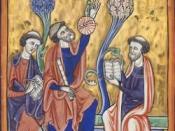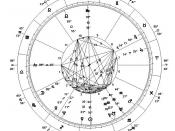Astrology and Astronomy were once a single science used for the same purpose: calculating time. Astronomy is the study and observation of the motions of heavenly bodies, and astrology, the study of the effects that the movements of these celestial bodies have on human affairs. Before the fifth century B.C., the Greeks, primarily sailors and farmers, used astronomy strictly to determine seasonal time. Even great thinkers and philosophers encouraged using the stars for practical purposes only, unaware that rising in other civilizations was a belief that certain constellations could do much more than assist in calculating the hour. Xenophon, who studied under Socrates in his early life (around 436 B.C.) said "...Sokrates told his pupils to learn astronomy only as far as needed to tell time from the stars at night..." (Lindsay, 68). By observing the positions of commonly known constellations, the Greeks were able to roughly estimate the time of year, marked and differentiated by each of the seasonal solstices.
These estimates were by no means precise, as mathematical astronomy did not develop until late in the fifth century, but determining the position of a constellation above the horizon was beneficial to creating more accurate calendars. Most early data that the Greeks collected about celestial bodies was derived from Persian and Babylonian traditions and fables, as well as mere practical observation of the stars. In the fifth and sixth centuries B.C. many cities in which Greek scientists and philosophers lived were under Persian rule, exposing them to the budding ideas of those who lived farther east. This flow of information created a medium in which the Greeks could advance their knowledge and practical use of natural elements, and eventually adapt their own practices of astrology, beyond the restrictions of scientific astronomy.
The Greeks, with their interest in the uses...


